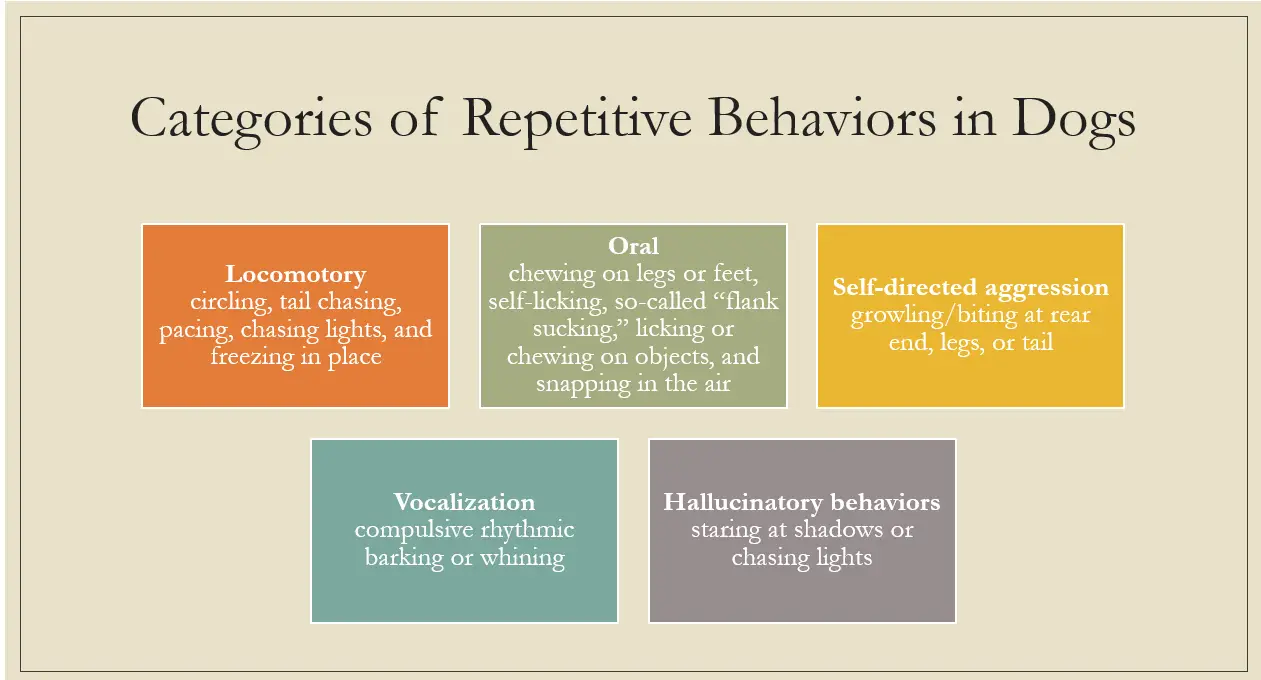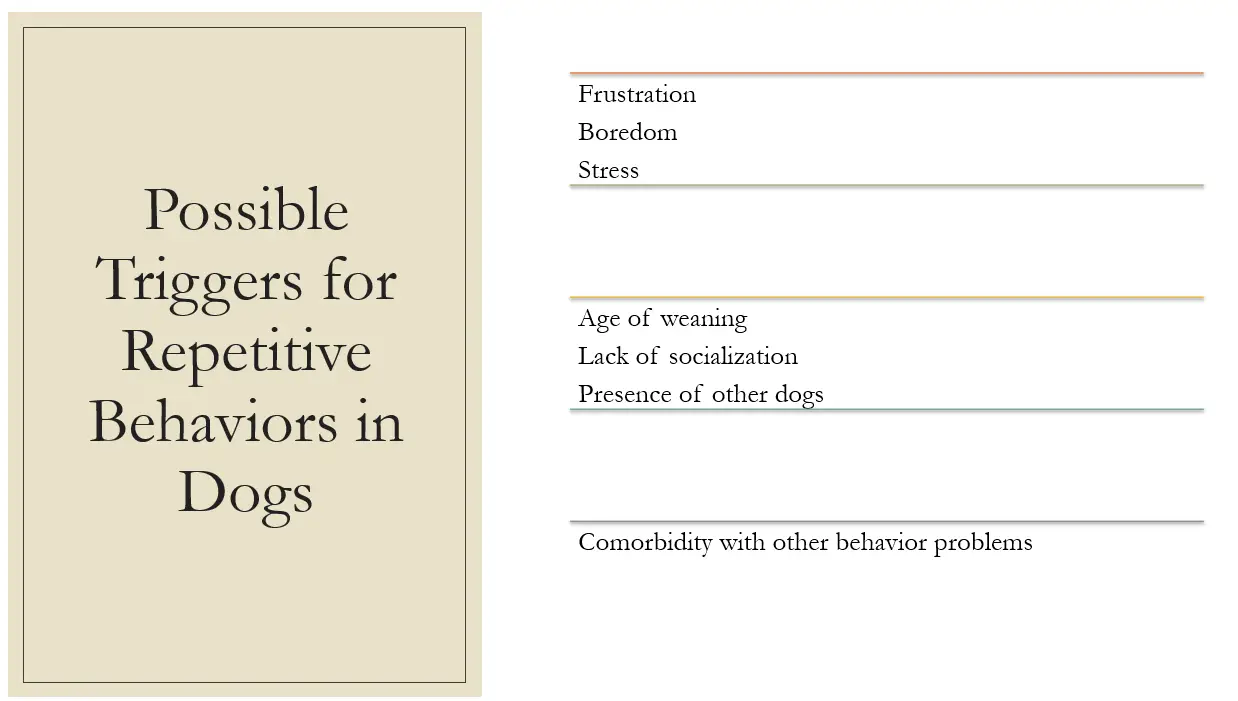In March 2022, Nature / Scientific Reports published a paper entitled "Aggressiveness, ADHD-like behavior, and environment influence repetitive behavior in dogs". Let's take a look at what they found, including types of repetitive behaviors in dogs, possible triggers for developing compulsive behaviors, which breeds are more likely to develop repetitive behaviors, and common treatments. I made a video, but you can also read the same information below.
More...
Study Details
The study used data about 4,500 Finnish pet dogs (ages 2.4 months to 17.9 years). Basically, families completed an online questionnaire about dogs' behavior. Of the 4,500 dogs, people reported that:
- 1,315 of those dogs displayed repetitive behaviors
- 3,121 of those dogs did NOT display repetitive behaviors
For context, prior research estimates that 16% of pet dogs show observable repetitive behaviors.
Types of Compulsive Dog Behaviors
Researchers categorize the various compulsive dog behaviors into 5 types:
- Locomotory - circling, tail chasing, pacing, chasing lights, and freezing in place
- Oral - chewing on legs or feet, self-licking, so-called “flank sucking,” licking or chewing on objects, and snapping in the air
- Self-directed aggression - growling/biting at rear end, legs, or tail
- Vocalization - compulsive rhythmic barking or whining
- Hallucinatory behaviors - staring at shadows or chasing lights
We've talked about chasing lights before. It's *really common in border collies.
Possible Triggers for Repetitive Behaviors in Dogs
Prior research reports that certain experiences may trigger repetitive behaviors in dogs, including:
- Frustration
- Boredom
- Stress
- Age of weaning
- Lack of socialization
- Presence of other dogs
- Comorbidity with other behavior problems
Findings of This Study
The researchers say, “Several demographic, environmental, and behavioral variables increased the probability of repetitive behaviors in dogs.”
Dog Demographics
- Age > “The age of the dog was associated with repetitive behavior.” Higher probability in young dogs and dogs over age 8.
- Sex > “Contrary to our priori hypothesis, there was no significant difference in repetitive behavior between male and female dogs.” Other studies *have found an association with sex, particularly male Bull Terriers.
- Sterilization > “There was an association between sterilization and repetitive behavior, as intact dogs had a lower probability of repetitive behavior than neutered dogs.” Other studies have found that particularly sterilized females
at lower probability of repetitive behaviors.
Dog Environmental Factors
- Exercise > “Dogs getting less daily exercise had a higher probability of repetitive behavior.” Specifically, dogs getting less than 1 hour of exercise per day
- Only Dog > “As hypothesized, dogs that were only dogs in the family had a higher probability of repetitive behavior than dogs living with other dogs.”
- 1st Dog > “If the dog was the owners first dog, it was more likely to have repetitive behavior.” This is a novel finding not seen in other research. Replication in future studies would be needed to solidify this finding.
- Family Size > “Dogs living in single-person households were less likely to show repetitive behavior than dogs living in two-person households or in larger families (more than 2 children or more than 2 adults in the family.)" This would also need to be validated by additional research.
Breeds Most Likely to Develop Repetitive Behaviors
Highest Probability
- German Shepherd Dogs
- Chinese Crested Dogs
- Pembroke Welsh Corgis
- Medium-sized Spitzes
- Staffordshire Bull Terriers
- Smooth Collie
- Miniature Schnauzer
- Lagotto Romagnolo
- Jack Russel Terrier
- Rough Collie
The researchers also found some breed difference in terms of the type of repetitive behaviors different breeds develop, such as:
- Higher Prevalence Tail Chasing in Staffordshire Bull Terriers
- Higher Prevalence Staring and Air Snapping in Border Collies
Behavioral Factors
Dogs with higher scores for these other behaviors had higher probability of exhibiting repetitive behaviors:
- Hyperactivity / impulsivity
- Inattention
- Aggressiveness - In particular, higher levels of aggressiveness increased probability of repetitive behaviors.
Is It Like Human OCD?
Some say yes. Some say no, but there are similarities:
- Early age of onset
- Behavioral inflexibility resulting from executive function impairment
- Structural abnormalities in the brain
- Increased blood cholesterol levels
- Imbalanced pathways for serotonin and dopamine
Common Treatments for Repetitive Behaviors in Dogs
Doctors also use similar meds and other treatments for these behaviors in people and dogs such as Fluoxetine (Prozac) or Clomipramine (Anafranil for people; Clomicalm for dogs)
Why This Matters?
“As abnormal repetitive behavior can considerably worsen the well-being of dogs and impair the dog-owner relationship, understanding the factors affecting canine repetitive behaviors can benefit both dogs and humans.”





Excellent article Roxanne! Will send to my German Shepherd rescue group and others.